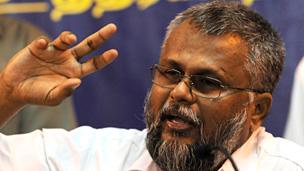Sri Lanka war crimes panel gets lost in translation
- Published

Translation of Douglas Devananda's speech was at times on a virtually word-by-word basis
A key witness at the commission set up to examine the final phase of Sri Lanka's civil war has complained his words were not properly translated.
Douglas Devananda, a cabinet minister and ex-Tamil militant, gave a three-hour testimony in the Tamil language.
But he stopped several times to dispute English translations by an interpreter, who looked tired and stressed.
The panel is investigating war crimes claims at the end of the long war, which the Tamil Tiger rebels lost.
Mr Devananda, who is the minister in charge of refugee resettlement, also overlooked several requests from the panel's chairman that he shorten or paraphrase his speech, which he read out.
At times the translation was virtually on a word-by-word basis.
Microphone issues
Friday's procedural problems were the commission's first serious ones, although at earlier sessions some witnesses have failed to speak fully into the microphone, and some of those present appeared unable to hear witnesses.
Briefly answering questions from commissioners in English at the end, Mr Devananda was asked about allegations made by Tamils in the north that pro-government elements were engaging in extortion, for instance taking paddy from farmers.
The minister, a former Tamil militant who crossed to the government side two decades ago, admitted some of this was happening, but said it was "almost under control now".
But he also said that other claims, for instance of kidnappings, were largely "rumours" based on "LTTE [Tamil Tiger] propaganda".
Last month in the northern town of Vavuniya, some civilians told the commission that their husbands or sons had been abducted more than a year ago and never seen again.
Mr Devananda, a victim of repeated assassination attempts by the LTTE in the past, said the defeated separatist movement had "pushed the Tamil people into a pit".
He said they had ignored all humanitarian appeals to let civilians cross to safe areas towards the end of the war.
Mr Devananda said he believed President Mahinda Rajapaksa was an open-minded man committed to peace.
But he repeated his position that the government should implement a long-pending constitutional measure to devolve more powers to the provinces.
There are to be more hearings in the coming month, including some in the former war zone in the north.